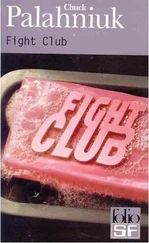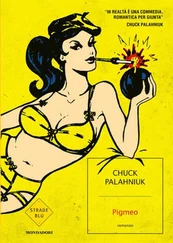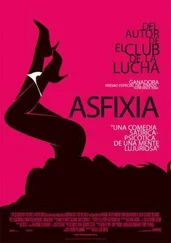Oyster says, «My thing is music, and Mona's thing is … well, stupidity is Mona's thing.»
With Helen's voice, he says, «This afternoon, Mona woke up in some beauty salon, getting her nails painted pink.» He says, «She stormed back to the office, she found Mrs. Boyle facedown on her desk in some kind of a coma.»
Helen shudders and grabs her stomach. She says, «Open in front of Mrs. Boyle was a translated spell, called an occupation spell. In fact all the spells were translated.»
She says, Oyster says, «God bless Mom and her crossword puzzles. She's in here somewhere, mad as hell.»
Oyster says, through Helen's mouth says, «Say hi to Mom for me.»
The brittle blue statue, the frozen baby, is shattered, broken among the broken jewels, a busted-off finger here, the broken-off legs there, the shattered head.
I say, so now he and Mona are going to kill everybody and become Adam and Eve?
Every generation wants to be the last.
«Not everybody,» Helen says. «We're going to need some slaves.»
With Helen's bloody hands, he reaches down and pulls her skirt up. Grabbing her crotch, he says, «Maybe you and Mom will have time for a quickie before she's toast.»
And I heave Helen's body off my lap.
My whole body aching more than my foot ever ached.
Helen cries out, a little scream as she slides to the floor. And curled there on the cold linoleum with the shattered gems and fragments of Patrick, she says, «Carl?»
She puts a hand to her mouth, feels the jewels embedded there. She twists to look at me and says, «Carl? Carl, where am I?»
She sees the stainless-steel cabinet, the broken gray window. She sees the little blue arms first. Then the legs. The head. And she says, «No.»
Spraying blood, Helen says, «No! No! No!» and crawling through the sharp slivers of broken color, her voice thick and blurred from her ruined teeth, she grabs all the pieces. Sobbing, covered in bile and blood, the room stinking, she clutches the broken blue pieces. The hands and tiny feet, the crushed torso and dented head, she hugs them to her chest and screams, «Oh, Patrick! Patty!»
She screams, «Oh, my Patty-Pat-Pat! No!»
Kissing the dented blue head, squeezing it to her breast, she asks, «What's happening? Carl, help me.» She stares at me until a cramp bends her in half and she sees the empty bottle of liquid drain cleaner.
«God, Carl, help me,» she says, clutching her child and rocking. «God, please tell me how I got here!»
And I go to her. I take her in my arms and say, at first, the new owner pretends he never looked at the living room floor. Never really looked. Not the first time they toured the house. Not when the inspector showed them through it. They'd measured rooms and told the movers where to set the couch and piano, hauled in everything they owned, and never really stopped to look at the living room floor. They pretend.
Helen's head is nodding forward over Patrick. The blood's drooling from her mouth. Her arms are looser, spilling little fingers and toes onto the floor.
In another moment, I'll be alone. This is my life. And I swear, no matter where or when, I'll track down Oyster and Mona.
What's good is this only takes a minute.
It's an old song about animals going to sleep. It's wistful and sentimental, and my face feels livid and hot with oxygenated hemoglobin while I say the poem out loud under the fluorescent lights, with the loose bundle of Helen in my arms, leaning back against the steel cabinet. Patrick's covered in my blood, covered in her blood. Her mouth is open a little, her glittering teeth are real diamonds.
Her name was Helen Hoover Boyle. Her eyes were blue.
My job is to notice the details. To be an impartial witness. Everything is always research. My job isn't to feel anything.
It's called a culling song. In some ancient cultures, they sang it to children during famines or droughts, anytime the tribe had outgrown its land. It was sung to warriors injured in accidents or the very old or anyone dying. It was used to end misery and pain.
It's a lullaby.
I say, everything will be all right. I hold Helen, rocking her, telling her, rest now. Telling her, everything is going to be just fine.
When I was twenty years old, I married a woman named Gina Dinji, and that was supposed to be the rest of my life. A year later, we had a daughter named Katrin, and she was supposed to be the rest of my life. Then Gina and Katrin died. And I ran and became Carl Streator. And I became a journalist. And for twenty more years, that was my life.
After that, well, you already know what happened.
How long I held on to Helen Hoover Boyle I don't know. After long enough, it was just her body. It was so long she'd stopped bleeding. By then, the broken parts of Patrick Boyle, still cradled in her arms, they'd thawed enough to start bleeding.
By then, footsteps arrived outside the door to room 131. The door opened.
Me still sitting on the floor, Helen and Patrick dead in my arms, the door opens, and it's the grizzled old Irish cop.
Sarge.
And I say, please. Please, put me in jail. I'll plead guilty to anything. I killed my wife. I killed my kid. I'm Waltraud Wagner, the Angel of Death. Kill me so I can be with Helen again.
And the Sarge says, «We need to get a move on.» He steps from the doorway to the steel cabinet. On a pad of paper, he writes something in pen. He tears off the note and hands it to me.
His wrinkled hand is spotted with moles, carpeted with gray hairs. His fingernails, thick and yellow.
«Please forgive me for taking my own life,» the note says. «I'm with my son now.»
It's Helen's handwriting, the same as in her planner book, the grimoire.
It's signed, «Helen Hoover Boyle,» in her exact handwriting.
And I look from the body in my arms, the blood and green drain-cleaner vomit, to the Sarge standing there, and I say, Helen?
«In the flesh,» the Sarge says, Helen says. «Well, not my own flesh,» he says, and looks at Helen's body dead in my lap. He looks at his own wrinkled hands and says, «I hate ready-to-wear, but any port in a storm.»
So this is how we're on the road again.
Sometimes I worry that Sarge here is really Oyster pretending to be Helen occupying the Sarge. When I sleep with whoever this is, I pretend it's Mona. Or Gina. So it all comes out even.
According to Mona Sabbat, people who eat or drink too much, people addicted to drugs or sex or stealing, they're really controlled by spirits that loved those things too much to quit after death. Drunks and kleptos, they're possessed by evil spirits.
You are the culture medium. The host.
Some people still think they run their own lives.
You are the possessed.
We're all of us haunting and haunted.
Something foreign is always living itself through you. Your whole life is the vehicle for something to come to earth.
An evil spirit. A theory. A marketing campaign. A political strategy. A religious doctrine.
Driving me away from the New Continuum Medical Center in a squad car, the Sarge says, «They have the occupation spell and the flying spell.» He ticks off each spell by holding up another finger. «They'll have a resurrection spell—but it only works on animals. Don't ask me why,» he says. She says, «They have a rain spell and a sun spell … a fertility spell to make crops grow … a spell to communicate with animals …»
Not looking at me, looking at his fingers spread on the steering wheel, the Sarge says, «They do not have a love spell.»
Читать дальше




